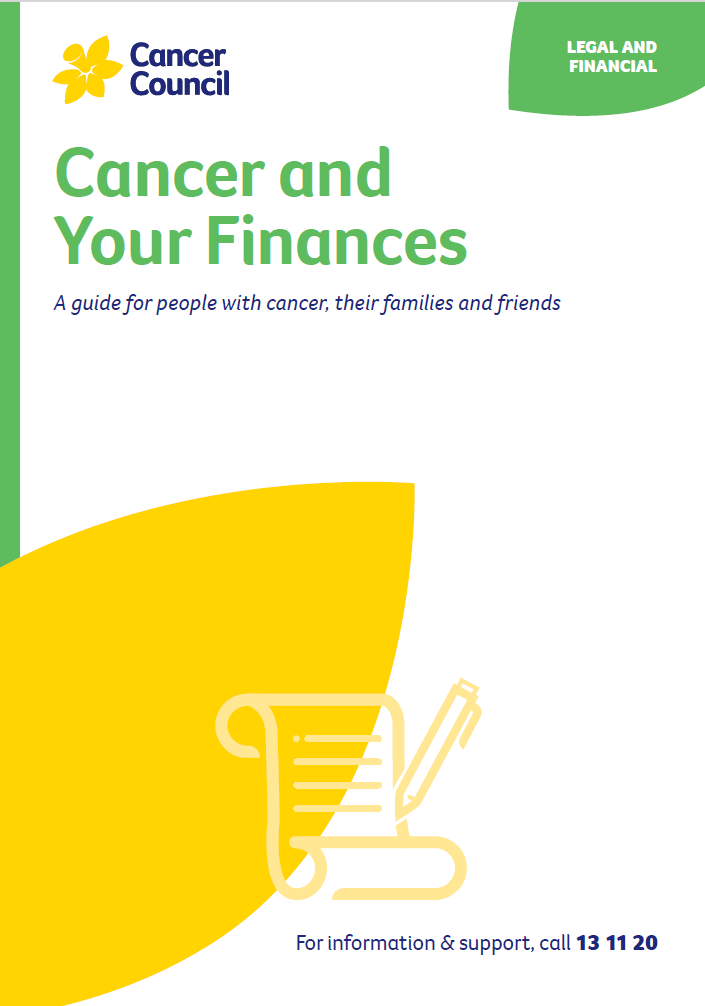- Home
- About Cancer
- Supporting someone with cancer
- Caring for someone with cancer
- Your role as a carer
- Financial concerns
Financial concerns
Financial challenges can add to the stress of being a carer. Getting professional help can take a great weight off your mind.
Learn more about:
- Financial concerns
- Getting help with finances
- Finding financial support for carers
- Watch videos: Managing the costs of cancer
Financial concerns
Caring for someone with cancer can cause money worries. There may be a drop in your household income if you or the person you are caring for needs to reduce work hours or stop working. There may also be new expenses such as medicines, tests, equipment and aids.
You may be able to get government benefits and payments and other financial support to help with these costs. For more information, read the opposite page, speak to a social worker on the treatment team or call Cancer Council 13 11 20. The person you are caring for may also be eligible for financial support.
For more on this, see Cancer and your finances.
Getting help with finances
Services Australia – This government agency offers a free, confidential Financial Information Service that provides information on financial matters. Call 132 300 or visit Services Australia to find out more.
Qualified professionals – Consider getting professional advice:
- Financial counsellors help people manage their personal budget and finances, including debt. To talk to a financial counsellor, call the National Debt Helpline on 1800 007 007. This is a free and confidential service.
- Financial advisers (also called financial planners) help people manage their assets and financial affairs, including superannuation. To find a financial adviser, visit moneysmart.gov.au and search for “financial advisers register”. Financial advisers usually charge fees.
Learn more about the financial support we offer.
Finding financial support for carers
| Centrelink benefits | Services Australia offers various payments. The Carer Payment is for carers who provide full-time daily care in the home of the sick person. The Carer Allowance is for carers who provide extra daily care. Centrelink benefits may be income and asset tested or have other eligibility requirements. For more information, contact Services Australia (phone 132 717) or ask a hospital social worker. |
| Hardship programs | Most utility providers offer payment options to customers who are having trouble paying bills. Credit providers also offer hardship variations to people having difficulty repaying loans and credit cards. For more information, talk to a hospital social worker or speak to a financial counsellor. |
| Travel payments | Every state and territory has a government scheme that provides financial help to people who need to travel long distances for specialist medical treatment that is not available in their local area. Many schemes also assist with the cost of accommodation. In some cases, financial assistance may also be available if a carer needs to travel with the patient to treatment. The eligibility rules are different for each state and territory. Ask a hospital social worker for more details or call Cancer Council 13 11 20. |
| Taxi subsidy scheme | Your state or territory may have a scheme that subsidises taxi travel for people with disabilities and their carers. For more information, visit Carer Gateway and search for “taxi subsidy scheme”. |
| Superannuation | In very limited circumstances, you may be able to access your superannuation early, such as to pay for a dependant’s medical treatment or due to severe financial hardship. Keep in mind that accessing this money may have tax implications and could affect your retirement income and insurance policies. To find out more, visit ato.gov.au, contact your super fund and seek professional advice. |
| Cancer Council | Depending on where you live and if you meet the eligibility criteria, Cancer Council may be able to provide some financial support or refer you to a qualified professional for free assistance – call 13 11 20 to find out more. |
→ READ MORE: Planning for the future
Podcast: How to Help Someone with Cancer
Listen to more of our podcast for people affected by cancer
Video: The cost of cancer
Understanding the costs of cancer treatment is crucial for planning ahead. From medical expenses to practical costs like travel and childcare, know what to expect and how to navigate financial decisions.
Video: Centrelink payments
Discover the financial support options available if you need to stop working due to illness. Learn about Centrelink payments, healthcare cards, and resources from the Cancer Council to help manage your financial situation.
Video: Debts and everyday expenses
Struggling with debt or bills? Learn how to manage your finances and get support from a financial counsellor. Watch now for practical tips and resources.
Dr Alison White, Palliative Medicine Specialist, Royal Perth Hospital, WA; Tracey Bilson, Consumer; Louise Dillon, Consumer; Louise Durham, Nurse Practitioner, Palliative Care Outpatients, Princess Alexandra Hospital, QLD; Katrina Elias, Carers Program, South Western Sydney Local Health District, NSW Health, NSW; Jessica Elliott, Social Worker, Youth Cancer Services, Crown Princess Mary Cancer Centre, Westmead Hospital, NSW; Brendan Myhill, Social Worker and Bereavement Research Officer, Concord Repatriation General Hospital, NSW; Penny Neller, Project Coordinator, National Palliative Care Projects, Australian Centre for Health Law Research, Queensland University of Technology, QLD; Olivia Palac, Acting Assistant Director, Occupational Therapy, Gold Coast University Hospital, QLD; Nicole Rampton, Advanced Occupational Therapist, Cancer Services, Gold Coast University Hospital, QLD; Shirley Roberts, Nurse Consultant, Medical Oncology, Northern Adelaide Cancer Centre, SA; Dr Elysia Thornton-Benko, Specialist General Practitioner, and UNSW Research Fellow, NSW; Kathleen Wilkins, Consumer; Helen Zahra, Carers Program, South Western Sydney Local Health District, NSW Health, NSW.
View the Cancer Council NSW editorial policy.
View all publications or call 13 11 20 for free printed copies.
